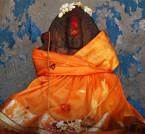LECTURE. Between Doctrine and Domesticity: Gender, Ethics, and the Vow of Sallekhanā
Between Doctrine and Domesticity: Gender, Ethics, and the Vow of Sallekhanā
“Emerging Scholars in Jain Studies” virtual series
We are happy to invite you to the next lecture in our “Emerging Scholars in Jain Studies” virtual series co-organized by the Departments of Religious Studies at UC Davis and UC Riverside. The lecture will be delivered by Dr. Miki Chase (University of Wisconsin-Madison) on Friday, March 7th, 2025, 9:00-10:20am PST. You will find more information about the lecture and the speaker below.
Register for the event here: https://ucr.zoom.us/meeting/register/zKGvnMwaRNCZZxRADNYaaA
Please note that you will need to sign into your Zoom account before entering the Zoom room.
Between Doctrine and Domesticity: Gender, Ethics, and the Vow of Sallekhanā
Santhāra, the Jain ritual fast until death, unfolds for lay practitioners within the intimate spaces of kinship, shaped by gendered expectations of care, renunciation, and self-effacement. Practiced primarily by elderly laywomen, santhāra employs a religious idiom to shift the burdens of aging and death within the household, where norms of ascetic, maternal, and elderly self-effacement converge. This talk draws on ethnographic research to follow the aftermath of two laywomen’s fasts, tracing how santhāra unfolds within familial entanglements. Jethiben’s years of small, deliberate acts toward renunciation culminated in her departure from household life despite her family’s reluctance, while Manishaben’s declining health led her children to “give” her the vow, acting as proxies in desperation. These contrasting cases complicate assumptions about ascetic agency, revealing santhāra not just as a religious practice but as an ethical gesture of repair—one in which gender informs the reconfiguration of motherhood, kinship, and vulnerability at the end of life.
Dr. Miki Chase is Assistant Professor and Śrī Anantnāth Chair in Jain Studies in the Department of Asian Languages and Cultures at the University of Wisconsin-Madison. She received her PhD in Anthropology from the Johns Hopkins University in 2022. Based on two years of fieldwork in Mumbai, Jaipur, and Delhi, her research explores the intersections of anthropology of law and religion with the ethics of death and dying, and her current book project in progress is an examination of women’s gendered negotiations of the ascetic ethical disposition in the Jain voluntary fast unto death. Her research has been funded by the American Institute of Indian Studies (AIIS) (2019-20) and the Wenner-Gren Foundation for Anthropological Research (2018-19).



